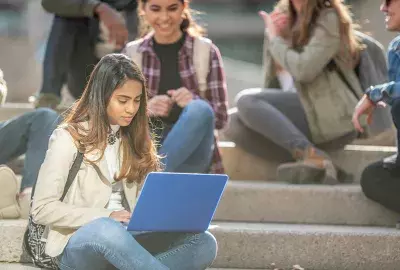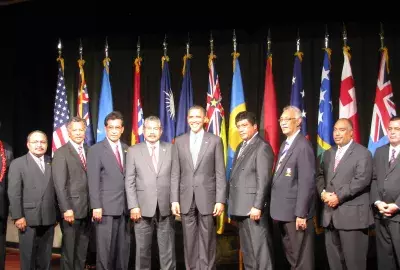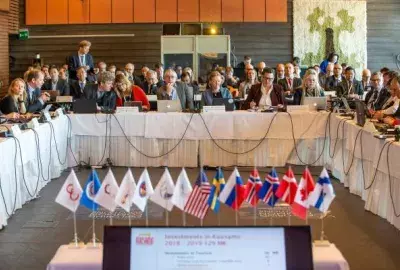Error message
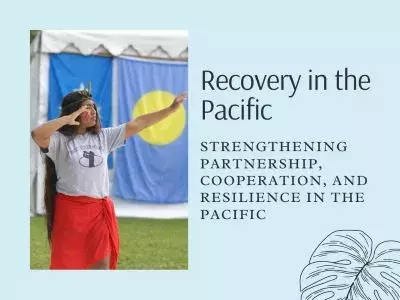
OFFICE/DEPARTMENT
HONOLULU (April 7, 2021) -- Most Pacific Island nations have done a remarkable job of keeping COVID-19 levels low by closing themselves off, an analyst said during a recent discussion on pandemic recovery in the Pacific, but the cost has been severe economic damage that will require billions of dollars in external support and perhaps a decade to repair. Others speakers said that for the region’s recovery to succeed, it must also be guided by equitable policies and built on traditional knowledge and community values.
The dialogue was part of the March 25 East-West Center virtual workshop “Strengthening Resilience, Cooperation, and Partnership in the Pacific.” Supported by the Government of Japan, the workshop convened academics, practitioners and policy professionals from Australia, Japan, New Zealand, Pacific Islands countries and the US with expertise in regional dynamics, compound climate threats and disaster recovery mechanisms pertinent to the region.
Economic Devastation
“No Pacific nation has been able to avoid the economic devastation that has trailed in COVID-19’s wake,” said Jonathan Pryke, director of the Pacific Islands Program at Australia’s Lowy Institute. “Tourism, remittances, natural resources—all have taken a hit, and some such as tourism have been absolutely decimated.”
Pryke said the institute’s analysis shows an overall economic contraction of ten percent across the region, with some especially hard-hit nations such as Fiji, Vanuatu and the Cook Islands suffering closer to a 20 percent decline. Moreover, he said, the effects are likely to be long lasting because of the difficulties in stimulating Pacific economies, which tend to grow slowly due to their small size and remote location.
“By our projections, average income per person in the Pacific will not recover to its 2019 level until 2028,” Pryke said, representing “a lost decade for development in the Pacific.” As a result, some US $3.5 billion in donor-driven stimulus grants and low-cost loans is needed over the next three years to help the region recover more quickly, he said. This includes funding for infrastructure and climate change adaptation projects along with critical social needs like health, education and income support for struggling households.
Valuing Traditional Knowledge
Dr. Kealoha Fox, a senior advisor for the Honolulu-based Institute for Climate & Peace, said that pandemic recovery efforts must also seek to build equity and climate resiliency for Pacific communities. “Here in Hawai‘i and across the greater Pacific region, there continues to be relatively little climate work that effectively centers what the human experience looks like for everyday people,” she said. “So we are working to catalyze a body of work that centers justice and activates a ground-up, resilient narrative.”
A Kanaka Maoli (Native Hawaiian) bioscientist and cultural practitioner who has written on Indigenous resilience, Fox said that ancestral values such as community subsistence and mutual aid have been essential in weathering the pandemic in the Pacific. Officials should draw on traditional wisdom and positive peace-building practices, she said, to help “transcend generational, ideological, and social divides in overcoming whatever barrier comes our way, whether that be COVID-19 or the impending climate issues that are upon us now.”
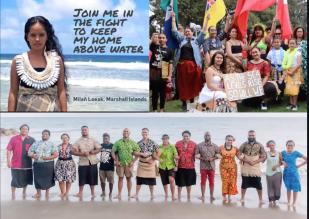
generation of climate warriors.
Equitable, inclusive recovery, she said, entails a commitment to ethical communication and “meaningful metrics that include everyone in the way that we design our solutions and interventions. We believe that sustainable peace is only achieved when everyone's voice is valued.”
Tapping Community Influencers
Dr. Mary Therese Perez Hattori, acting director of the Pacific Islands Development Program based at the East-West Center, said that for Pacific Island peoples “relationships are primary, and you see this throughout our responses to the pandemic and other threats.”
Hattori, who is of Indigenous Chamorro heritage from Guam, said that language fluency is one essential key: “In some island communities, we lack expertise around things like contact tracing and immunization. So it’s very important when we bring in outside experts that we also include navigators from the community who are language-proficient and can engage community members from all sectors and ages.”
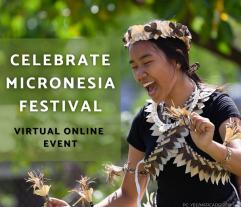
Honolulu’s annual Celebrate
Micronesia cultural festival went
online in 2020
In Hawai‘i, where Pacific Island communities have been disproportionately impacted by the pandemic, outreach organizations have become very proactive in tapping into community networks like church and youth groups, she said, as well as social media channels that community members use in their own languages. “Each community has its own influencers, who may not actually be in formal positions of leadership,” she said.
Pacific Islander networks have also drawn inspiration from other Indigenous groups, she said, pointing to the Social Distance Powwow Facebook group where Native American practitioners can share cultural performances remotely. “Many Indigenous peoples believe that the exchange of breath, which carries our wisdom and life energy, is sacred,” Hattori said. “So the inability to come together and share our breath, our cultural knowledge and performance, really created an existential crisis.”
The Social Distance Powwow group, Hattori said, was one of the earliest responses and has inspired many similar efforts, including this year’s virtual version of Honolulu’s annual Celebrate Micronesia festival, which she helps lead.
HONOLULU (April 7, 2021) -- Most Pacific Island nations have done a remarkable job of keeping COVID-19 levels low by closing themselves off, an analyst said during a recent discussion on pandemic recovery in the Pacific, but the cost has been severe economic damage that will require billions of dollars in external support and perhaps a decade to repair. Others speakers said that for the region’s recovery to succeed, it must also be guided by equitable policies and built on traditional knowledge and community values.
The dialogue was part of the March 25 East-West Center virtual workshop “Strengthening Resilience, Cooperation, and Partnership in the Pacific.” Supported by the Government of Japan, the workshop convened academics, practitioners and policy professionals from Australia, Japan, New Zealand, Pacific Islands countries and the US with expertise in regional dynamics, compound climate threats and disaster recovery mechanisms pertinent to the region.
Economic Devastation
“No Pacific nation has been able to avoid the economic devastation that has trailed in COVID-19’s wake,” said Jonathan Pryke, director of the Pacific Islands Program at Australia’s Lowy Institute. “Tourism, remittances, natural resources—all have taken a hit, and some such as tourism have been absolutely decimated.”
Pryke said the institute’s analysis shows an overall economic contraction of ten percent across the region, with some especially hard-hit nations such as Fiji, Vanuatu and the Cook Islands suffering closer to a 20 percent decline. Moreover, he said, the effects are likely to be long lasting because of the difficulties in stimulating Pacific economies, which tend to grow slowly due to their small size and remote location.
“By our projections, average income per person in the Pacific will not recover to its 2019 level until 2028,” Pryke said, representing “a lost decade for development in the Pacific.” As a result, some US $3.5 billion in donor-driven stimulus grants and low-cost loans is needed over the next three years to help the region recover more quickly, he said. This includes funding for infrastructure and climate change adaptation projects along with critical social needs like health, education and income support for struggling households.
Valuing Traditional Knowledge
Dr. Kealoha Fox, a senior advisor for the Honolulu-based Institute for Climate & Peace, said that pandemic recovery efforts must also seek to build equity and climate resiliency for Pacific communities. “Here in Hawai‘i and across the greater Pacific region, there continues to be relatively little climate work that effectively centers what the human experience looks like for everyday people,” she said. “So we are working to catalyze a body of work that centers justice and activates a ground-up, resilient narrative.”
A Kanaka Maoli (Native Hawaiian) bioscientist and cultural practitioner who has written on Indigenous resilience, Fox said that ancestral values such as community subsistence and mutual aid have been essential in weathering the pandemic in the Pacific. Officials should draw on traditional wisdom and positive peace-building practices, she said, to help “transcend generational, ideological, and social divides in overcoming whatever barrier comes our way, whether that be COVID-19 or the impending climate issues that are upon us now.”

generation of climate warriors.
Equitable, inclusive recovery, she said, entails a commitment to ethical communication and “meaningful metrics that include everyone in the way that we design our solutions and interventions. We believe that sustainable peace is only achieved when everyone's voice is valued.”
Tapping Community Influencers
Dr. Mary Therese Perez Hattori, acting director of the Pacific Islands Development Program based at the East-West Center, said that for Pacific Island peoples “relationships are primary, and you see this throughout our responses to the pandemic and other threats.”
Hattori, who is of Indigenous Chamorro heritage from Guam, said that language fluency is one essential key: “In some island communities, we lack expertise around things like contact tracing and immunization. So it’s very important when we bring in outside experts that we also include navigators from the community who are language-proficient and can engage community members from all sectors and ages.”

Honolulu’s annual Celebrate
Micronesia cultural festival went
online in 2020
In Hawai‘i, where Pacific Island communities have been disproportionately impacted by the pandemic, outreach organizations have become very proactive in tapping into community networks like church and youth groups, she said, as well as social media channels that community members use in their own languages. “Each community has its own influencers, who may not actually be in formal positions of leadership,” she said.
Pacific Islander networks have also drawn inspiration from other Indigenous groups, she said, pointing to the Social Distance Powwow Facebook group where Native American practitioners can share cultural performances remotely. “Many Indigenous peoples believe that the exchange of breath, which carries our wisdom and life energy, is sacred,” Hattori said. “So the inability to come together and share our breath, our cultural knowledge and performance, really created an existential crisis.”
The Social Distance Powwow group, Hattori said, was one of the earliest responses and has inspired many similar efforts, including this year’s virtual version of Honolulu’s annual Celebrate Micronesia festival, which she helps lead.
Web Article
Recent online articles and analysis that have been published on the East-West Center website.





